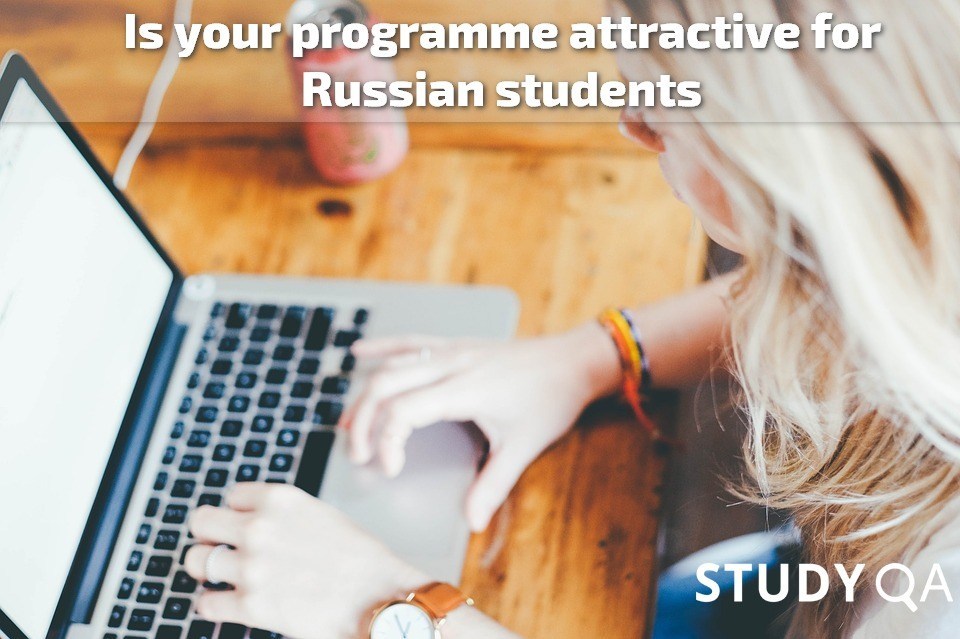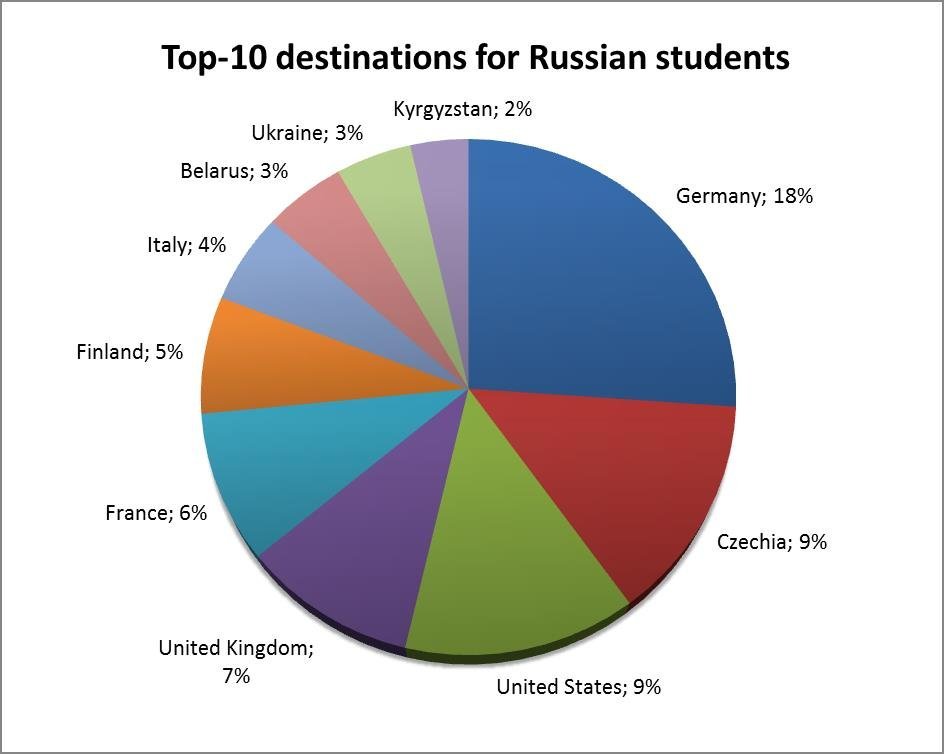Is your programme attractive for Russian students?

Universities are striving to attract talents. In this article we provide some useful tips to be considered by educators when evaluating the potential of Russian market. We divided factors that influence students’ decision-making into two big groups - school-related and country-related. School-related factors can be influenced by the admissions office or, in general, by the university, whilst the country-related factors create a general framework, in which universities operate.
According to UNESCO data, students from Russia amount for 1.5% of all international students in the world. The first ten destinations together make 68% of all Russian students abroad, with Germany, Czech Republic and the US in top-3.

Many Russians study in the UK, France, Italy, Belarus and Ukraine. It is worth mentioning, that there are two quite distant destinations (Australia and Canada) in the list of countries, who host 2% of outbound students. This must be explained by the high standards of living, easy immigration procedures for high-skilled workers and promising job market conditions there.
|
Destination country |
Number of students |
Percentage |
|
Germany |
9953 |
18% |
|
Czechia |
5305 |
9% |
|
United States |
5203 |
9% |
|
United Kingdom |
3933 |
7% |
|
France |
3599 |
6% |
|
Finland |
2799 |
5% |
|
Italy |
2178 |
4% |
|
Belarus |
1953 |
3% |
|
Ukraine |
1814 |
3% |
|
Kyrgyzstan |
1377 |
2% |
|
Turkey |
1158 |
2% |
|
Armenia |
1140 |
2% |
|
Canada |
1140 |
2% |
|
Austria |
1128 |
2% |
|
Kazakhstan |
1097 |
2% |
|
Switzerland |
1011 |
2% |
|
Australia |
880 |
2% |
|
Netherlands |
794 |
1% |
|
Poland |
754 |
1% |
|
Israel |
750 |
1% |
|
Other destinations |
8362 |
15% |
|
Total number of mobile students abroad |
56328 |
100% |
School-related
- Level of education
Degree programmes are more popular than short-cycle programmes among international students, and MSc and PhD programmes are more popular than BSc.
According to OECD Education at a Glance 2016 report international enrolments in 2014 were around 5% at the bachelor’s level, 12% – at the master’s level and 27% - at the doctoral level. The share of international students in short-cycle tertiary programmes was only 3%. Hence, when promoting your institution in Russia, or in general abroad, focus on more advanced tertiary-level programmes.
- Major
Business and management dominate in the list of courses Russians study abroad. Other popular subjects are IT, science and technology, engineering, medicine, fashion and design. Employability is the key in understanding this trend - degrees in these fields are more requested in the international labour market. Students expect that getting a degree in these areas raise their chances for successful employment abroad and guarantee them a higher salary.
- Affordability: tuition fees, availability of scholarships from inflow university
Students from Russia and CIS, compared with students from developed countries, put more weight on the economic factors. You will significantly increase the attractiveness of your programme by providing merit-based and/or need-based scholarships.
- Language of instruction
If the programme you offer is in English, it will definitely attract more students. Other popular foreign languages are German, French and Italian.
- Partner-universities
Many students get to know about opportunities to study abroad during their bachelors studies. In addition, students tend to try short mobility programmes or summer schools first. Doing this they get acquainted with the incoming environment and make a better-informed choice. Try to develop your partner universities network in Russia and you will reach more prospective talented Russian students.
- Peer reviews and detailed insights
Students search for very detailed information on all aspects of their study abroad experience. They also appreciate personal advice from trusted sources, especially peer reviews and testimonials from international alumni. If you already have Russian students or alumni, engage them in your marketing campaign to facilitate peer-to-peer connections.
Country-related
Empirical studies show the following determinants of international talent flow:
- economic integration between countries
- geopolitical factors, such as political alliances
- the quality of higher education
- the immigration possibilities (visa procedures, future employability)
- the per capita income gap between the outflow and inflow countries
- language and culture between the two countries
- affordability: currency factor, availability of state scholarships
Students from Russia and CIS, compared with students from developed countries, put more weight on the economic factors, regardless of the inflow country being a developed or developing one. Among developed countries, they are more inclined to choose the better developed one. Among developing countries, they value the economic factors as well as other factors.
We would like to note that foreign exchange rates have been shown to influence demand for study abroad. The Russian ruble has been declining in recent years against the US dollar and British pound, which has led to a shift in student demand to more affordable destinations. Educators can adapt by doing some price discounting and compensating for the currency factor.
According to our analysis, a German master's programme in business and management, taught in English, with scholarships available, will have no problem in recruiting the most talented Russian students. However, if this is not your case, try to cover in your marketing campaign all the sensitive issues: promote your English-taught masters and PhDs, focus on the most requested majors, describe the quality of higher education and immigration possibilities, and explain the funding possibilities or scholarship schemes. A good idea would be to involve current Russian or CIS-students in the marketing, because peer reviews and detailed insights do matter for the decision-making.
More on the topic: learn what Russian students expect from education abroad.